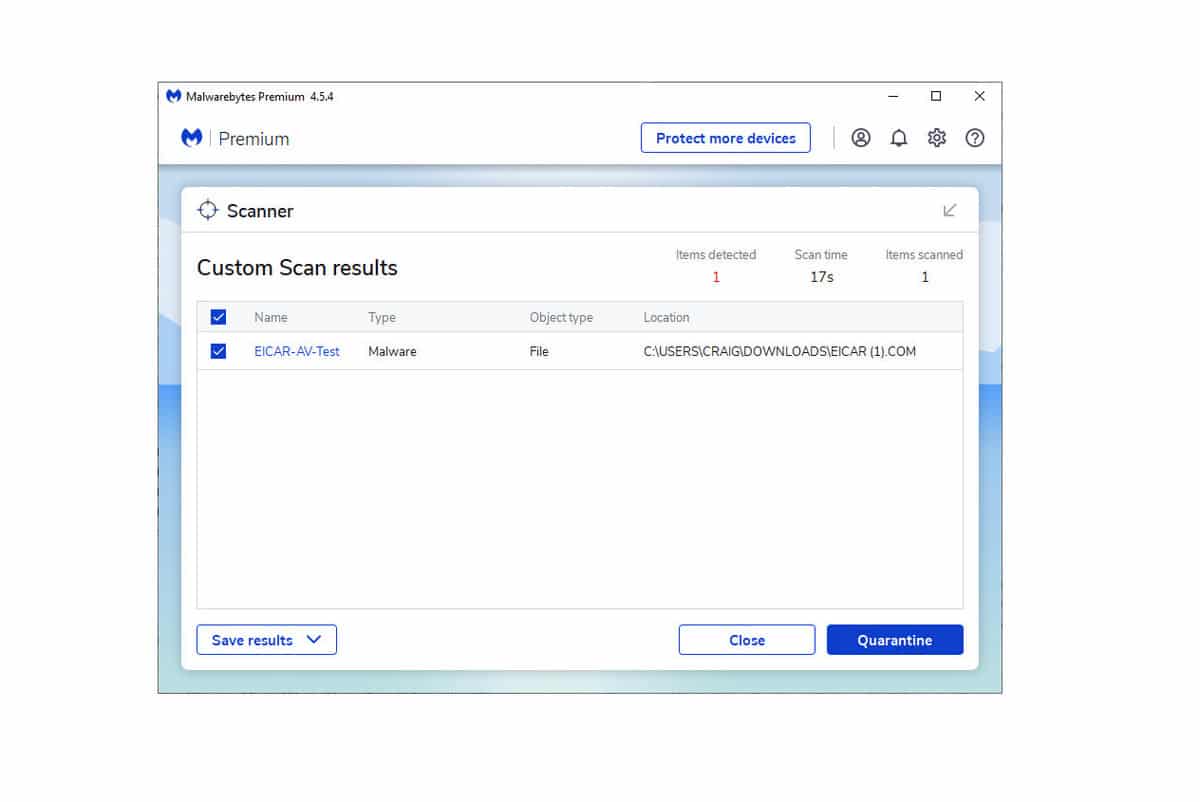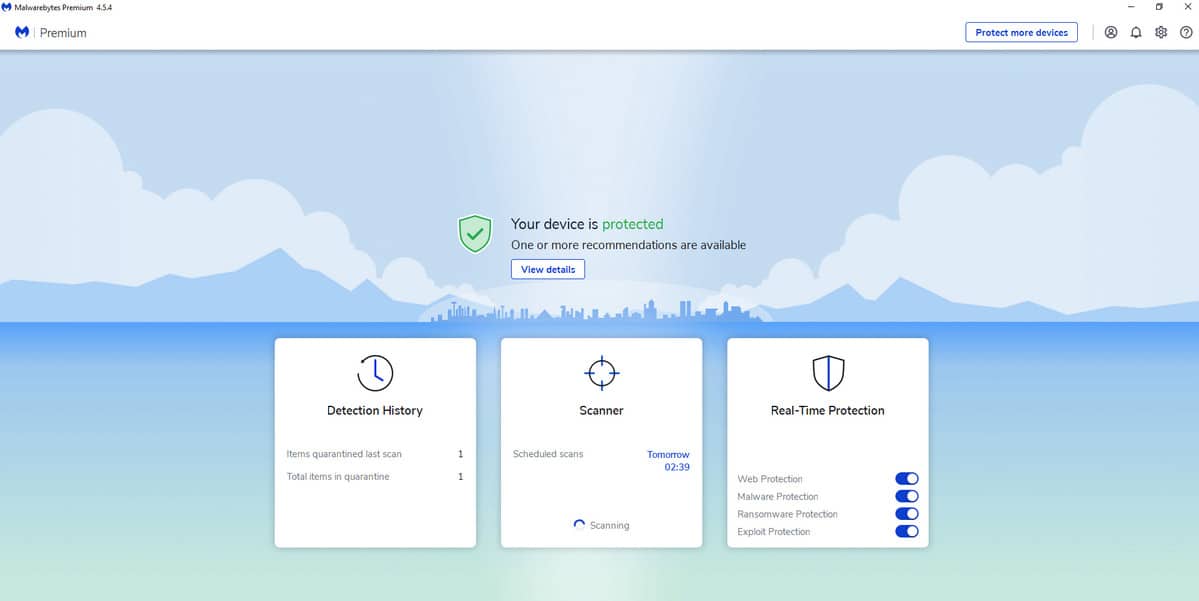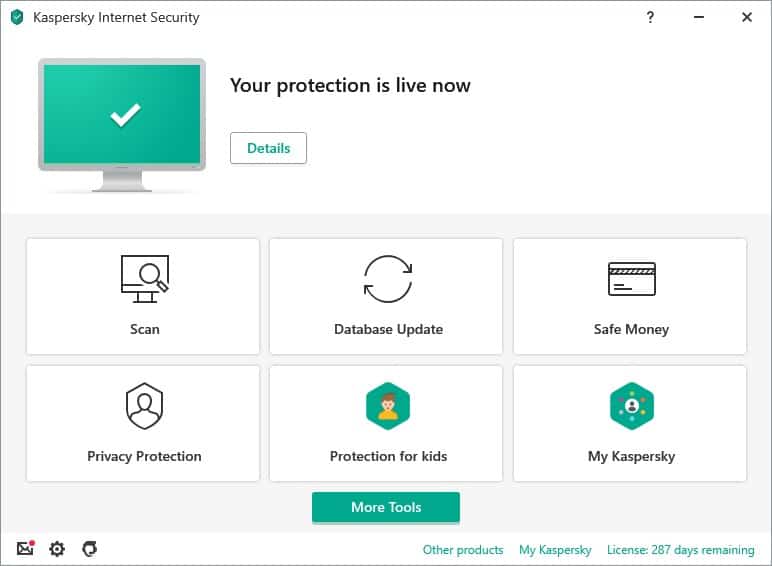Kaspersky and Malwarebytes don’t just protect users from cyber threats; they’re powerhouses that go beyond basic malware removal. I’ve tested both on my own rig, diving deep into malware removal, customer service, and how much of your PC’s resources they use up.
Spoiler alert: Kaspersky takes the crown, offering a more comprehensive suite of features like parental controls and cloud backup, not to mention its superior malware detection and some unbeatable first-year discounts.
Not everyone has time to read lengthy articles, so here’s a spoiler to summarize what you’ll find out: Kaspersky won the comparison because of its broader features like parental controls and cloud backup. It also performed better during malware detection and provided some enticing first-year discounts for new users.
Summary: Malwarebytes vs Kaspersky
Malwarebytes Premium
- Regularly updated malware database
- VPN is included
- Malicious links/phishing protection
Kaspersky Internet Security
- Strong malware defense
- Password manager
- 2FA for online account
| No value | Malwarebytes | Kaspersky |
| Website | malwarebytes.com | kaspersky.com | Real-time protection | Web protection/anti phishing | Antivirus and Antispyware | VPN | Firewall | Password Manager | Ransomware protection | PC Cloud Backup | Automatically update apps | Identity Theft Protection | Parental controls | File Shredder | Performance Optimization |
|---|---|---|
| Best deal (per month) | $2.81 SAVE 25% | $2.49 GET 70% OFF |
BEST DEAL FOR MALWAREBYTES:Save 25% on Malwarebytes Premium and protect yourself from all online threats.
BEST DEAL FOR KASPERSKY:Save up to 50% on Kaspersky products and protect all of your home or business devices.
Background
Malwarebytes
The Malwarebytes Corporation founded Malwarebytes Anti-Malware (MBAM for short) in 2006 as a tool for Windows and Mac operating systems to find and detect threats on consumer computer systems. The product around today, now known as Malwarebytes, takes consumer security to a new level with real-time malware detection, privacy-shielding tools, and more.
Kaspersky
Kaspersky made its debut in 1997 in Moscow, Russia, after being founded by Natalya Kaspersky, Alexey De-Monderik, and the current CEO Eugene Kaspersky. In its early days, what began as antivirus software has grown to provide several cybersecurity functions, including password management, internet security, endpoint security, and more. According to a recent report, Kaspersky is regarded as the third biggest vendor for consumer IT security.
Malwarebytes vs Kaspersky pricing
When you’re switching from free antivirus to a premium subscription, it is more attractive when you’re getting a deal or discount along with your purchase. Most antivirus providers give users a discount for the first year of signing up, so I’ve researched Malwarebytes’ and Kaspersky’s websites to see what’s available.
Malwarebytes offers a decent variety of plans, ranging from essential protection for freebie users to a top-notch plan that includes a VPN to bolster your privacy. It should be noted that Malwarebytes doesn’t offer any promotional discounts on any of its plans to incentivize user signups – in other words, there’s no benefit to signing up to an annual plan versus monthly billing.
| No value | Malwarebytes Free | Malwarebytes Premium | Malwarebytes vs Kaspersky: Full antivirus comparision | Malwarebytes |
| Website | malwarebytes.com | malwarebytes.com | malwarebytes.com | One year price | Free | $39.99 | $99.99 | Renewal price | N/A | N/A | N/A |
|---|---|---|---|---|
| Best deal (per month) | Free FREE download | $2.81 GET 25% OFF | $2.81 SAVE 25% |
Breaking down things a little further, with Malwarebytes Free, you’ll get an average level of protection, including an antimalware tool that lets you scan your PC for threats lurking in your file system. You can use the software on a single device, but this doesn’t include real-time scanning (looking for threats as soon as they infect your system).
Stepping things up a little is Malwarebytes Premium. You’ll get protection for a single device, which will set you back $39.99 for the year. All features of Malwarebytes Free are included, but you’ll also benefit from real-time malware detection. A phishing and link scanner looks for malicious websites that aim to steal your data by looking like authentic websites. It includes uninstall protection, which prevents attackers from uninstalling the software without your permission, as well as ransomware, zero-day exploits, and brute force protection. Malwarebytes Browser Guard is also included, which prevents trackers from following your browsing activity, and an ad blocker stops annoying ads from showing.
Malwarebytes Premium with five devices is the way to go if you need protection for more devices. This includes all the features of the other premium plan for $79.99 – the only difference is the device limit.
Finally, Malwarebytes Premium Plus Privacy includes all of the features of the other plans plus a VPN (Virtual Private Network). It’ll cost you $99.99 per year, but you’ll get an extra layer of privacy for the extra cash, hiding your internet activity from prying eyes. It’ll also encrypt your connection in insecure places like public wifi hotspots where hackers could steal your sensitive data.
Malwarebytes offers a 60-day money-back guarantee across all of its plans.
Moving onto Kaspersky, it has five pricing tiers, ranging from essential protection for free to an all-in-one security suite.
| No value | Kaspersky Security Cloud | Kaspersky Antivirus | Kaspersky Internet Security | Kaspersky Total Security | Kaspersky Security Cloud Personal |
| Website | https://kaspersky.ca/ | https://kaspersky.ca/ | https://kaspersky.ca/ | https://kaspersky.ca/ | https://kaspersky.ca/ | One year price | Free | $17.99 | $23.99 | $26.99 | $26.99 | Renewal price | N/A | $59.99 | $79.99 | $89.99 | $89.99 |
|---|---|---|---|---|---|
| Best deal (per month) | Free Free download | $2.49 Save 70% on Antivirus solutions | $1.99 70% OFF - 1 year - 3 devices | $2.49 GET 70% OFF | $2.24 70% first year discount |
First up is Kaspersky Security Cloud, which is entirely free. Their free plan protects your system and mobile devices from viruses, infected files, dangerous applications, and suspicious sites. You can install the app on as many devices as you need. With real-time malware definition updates, you have peace of mind knowing the software is checking for the latest threats.
Kaspersky Antivirus is the first level of consumer protection offered, costing $29.99 for the first year and then going up to $59.99 afterward. You’ll benefit from the features available in the free plan plus real-time antivirus and anti-malware protection instead of on-demand scanning only. It also includes a network attack blocker & anti-ransomware to prevent hackers from breaking into your home network & intercepting your data. This plan lets you install the software on up to three devices.
Kaspersky Internet Security is next, including the features of its base plans plus a VPN with a 300 MB per day data cap. Its Safe Money feature protects online payments & transactions, and webcam protection is also included. Game mode silences the software during resource-heavy gaming sessions, and wifi security protects your home networking devices and peripherals. Protection covers three devices. It’s $39.99 for the first year and then rises to $79.99 afterward.
Kaspersky Total Security offers everything of the previous plans but takes security to another level. In addition to everything else, this suite has a child GPS locator, a password manager, and encrypted storage to keep your sensitive files safe. Protection is available for ten devices for $49.99 before increasing to $99.99.
Kaspersky Security Cloud Personal differs from the free version of Kaspersky Security Cloud in that it offers antivirus, anti-ransomware, password management, VPN, data leak detection, home wifi network monitoring, HDD health check, and parental controls. Unlike the free version, this software protects all of your devices, not just Windows systems. It comes in at $53.99 for year one and then rises to $89.99.
Kaspersky offers a 30-day free trial on all subscriptions and a 30-day money-back guarantee that lets you cancel within a month for a full refund.
Effectiveness against malware
While Malwarebytes and Kaspersky are known for their ability to remove viruses and malware, I wanted to see for myself how they performed. I downloaded four virus samples from the EICAR (The European Institute for Computer Antivirus Research) that consisted of an executable, a .txt file, and two compressed executable files. I also downloaded three live samples containing adware and trojans as compressed executables.
I ran two tests on my PC: a real-time scan that should theoretically detect the samples the moment they are downloaded, and an on-demand scan that finds them during a scan of my file system.
Real-time test

I enabled real-time scanning for each provider (separately to avoid conflicts) and downloaded the samples.
| No value | Malwarebytes | Kaspersky |
| Website | malwarebytes.com | kaspersky.com | Eicar Sample 1 | Blocked | Blocked | Eicar Sample 2 | Allowed | Blocked | Eicar Sample 3 | Blocked | Blocked | Eicar Sample 4 | Allowed | Blocked | Eicar Sample 1 | Blocked | Blocked | Live Sample 2 (Trojan) | Blocked | Blocked | Live Sample 3 (Trojan) | Blocked | Blocked |
|---|---|---|
| Best deal (per month) | $2.81 SAVE 25% | $2.49 GET 70% OFF |
Malwarebytes allowed one of the compressed executables and the .txt file but blocked two of the other EICAR samples. It blocked all of the live samples without any issues.
Meanwhile, Kaspersky blocked all of the samples immediately after I downloaded them.
On-demand scan results (quick)
I continued my research with a quick, mini-scan that looks at the most common places for malware threats. Kaspersky didn’t find any of the threats, and it was the same for Malwarebytes.
On-demand scan results (full)
I then ran a full scan to search for the samples in my file system. Malwarebytes still missed the same samples as it did in real-time, and Kaspersky found all of the samples and blocked them.
I took my research even further to understand what AV-Test and AV-Comparatives were saying about the providers in terms of their lab research.
For context, AV-Test’s Malware Protection Test looks at how each software detects threats in an offline environment, such as those introduced by external drives. AV-Comparatives’ Real-World Protection Test measures the effectiveness of how the software deals with threats found online such as malicious downloads.
AV-Comparatives
Looking at the results provided by the AV-Comparatives Real-World- Protection Test from July to October 2021, Kaspersky scored zero for False Positives – classifying legit files as threats (the lower, the better). The test also uses 743 test malware samples to see how the software reacts to them, of which Kaspersky scored a 99.9% detection rate.
Malwarebytes achieved a much less impressive score of 12 for false positives and a 99.6% detection rate.
AV-Test
In AV-Test’s research, Kaspersky scored an impressive 100% protection rate for the malware Protection Test in September and October 2021 for protection against 0-day malware attacks, including web and e-mail threats (Real-World Testing). It also scored 100 in both months for detecting widespread and prevalent malware discovered in the last four weeks.
Malwarebytes report for the same period saw the software achieving 98.5% for protection against 0-day malware attacks, inclusive of web and e-mail threats in September 2021 and 98.5 percent in October 2021. For detection of widespread and prevalent malware discovered in the last four weeks, it scored 100% in September and October 2021.
This backs up the findings performed in my own tests.
Impact on PC performance
Next, I looked at how the software impacted my computer’s performance while running on-demand scans and during real-time background scanning.
As well as looking at the time it took for scans to run and how many files each software scanned, I used Windows performance monitor to measure my CPU usage and other resources.
| No value | Malwarebytes | Kaspersky |
| Website | malwarebytes.com | kaspersky.com | Full Scan Time (minutes) | 256 | 227 | Number of scanned objects | 859,819 | 2100000 | Full Scan CPU Utilization % | 6 | 100 | Full Scan Memory Utilization % | 26 | 76 | Full Scan Disk Utilization (seconds) | 38 | 316 | Control CPU Utliization % (no scan) | 10 | 46 | Control Memory Utilization % (no scan) | 51 | 70 | Control Disk Utilization (seconds) (no scan) | 14 | 12 | Quick Scan Time (seconds) | 90 | 273 | Quick Scan CPU Utilization % | 52 | 71 | Quick Scan Memory Utilization % | 79 | 73 | Quick Scan Disk Utilization (seconds) | 64 | 531 |
|---|---|---|
| Best deal (per month) | $2.81 SAVE 25% | $2.49 GET 70% OFF |
Kaspersky took almost four minutes to run a quick scan and 227 minutes to scan 2,100,000 of my files.
In contrast, Malwarebytes took 90 seconds to run a quick scan, but its 256-minute full scan was much less in-depth, only scanning 859,819 files.
While running each scan, I recorded the resources in the table above. Kaspersky used more resources than Malwarebytes during control scanning except for disk utilization. It was also more resource-heavy during full scans – but not enough to notice any lag in system performance.
I compared my research to AV-Test and AV-Comparatives to see how each had performed in their in-depth lab testing.
AV-Comparatives
The performance test performed by AV-Comparatives takes the following categories into account during testing:
- Downloading files
- Browsing websites
- File Copying: first and subsequent run
- Installing and uninstalling applications
- Archiving and unarchiving
Checking out the October 2021 performance test, Kaspersky performed brilliantly except for first-run application launches. Malwarebytes didn’t match the performance, slipping up in the first and subsequent runs when launching applications.
AV-Test
I looked at the product overview report provided by AV-Test for September to October 2021. I found that Kaspersky Internet Security scored full marks (6/6) for its overall performance.
Malwarebytes also achieved 6/6 for performance during the same period.
Malwarebytes vs Kaspersky features
Although malware scanning and looking for viruses is paramount from software like Malwarebytes and Kaspersky, they also have many other features to secure your devices. Check them out below.
Malwarebytes Premium Plus Privacy
- Anti-Spyware
- Antivirus and anti-malware
- Ransomware Protection
- Online Threat Protection
- Secure VPN
- Anti-phishing and link scanning
- Defends against viruses, ransomware and more
- Reinforced browser for banking
- Password manager
- Compatible on PC, Mac, and mobile
- Blocks phishing
- Safe kids parental controls
- File backup protection
- Child GPS tracking
- Webcam protection
Some of the tools listed are similar with each provider, but they also have some stand-out features that will further enhance your security. I’ve detailed some of them below.
- Secure VPN: While you surf the web, download files, and stream your favorite TV shows, all of your activity is logged by your ISP. Malwarebytes premium Plus Privacy provides a VPN to stop snoopers in their tracks with an anonymous IP address and an encrypted connection.
- Browser Guard: Stop third parties and advertisers from following you around the web. Use Malwarebytes Browser Guard, and you’ll stop annoying ads from popping up and prevent trackers from capturing your browsing habits.
- Phishing and link protection: Hackers host malicious websites made to look like your bank or other sites you trust to trick you into revealing your passwords and payment details. Malwarebytes stops attackers in their tracks by warning you about dangerous websites.
- Child GPS tracking: Installing Kaspersky on your child’s mobile helps you always know where they are. If their phone gets stolen, you can track it down with speed with exact GPS location technology.
- Webcam protection: Hijackers looking to access unsecured webcams can gain control to exploit or blackmail unsuspecting users. Webcam protection helps by locking down your camera for your use only.
- Password manager: Thanks to Kaspersky, you’ll never need to remember a password again. A password manager suggests strong passwords and stores them in a protected vault, ready for you to access as you need them.
Sign up and installation
User Experience in Subscription and Installation
A seamless subscription process is crucial for user retention, as cumbersome steps can deter potential customers. To assess Malwarebytes and Kaspersky’s user-friendliness, I navigated through their respective checkout procedures. Both platforms adhere to industry-standard practices, requiring basic information and payment details to complete the subscription.
Note: Auto-renewal is activated by default upon subscription. Users not interested in automatic renewal should manually disable this feature.
Comparative Analysis
Kaspersky streamlines the user experience by offering an immediate download option post-subscription, followed by a prompt for sign-in upon installation completion. Malwarebytes, however, introduces an additional step: users must first download the free version, obtain an activation code, and then upgrade to the premium tier. While not overly complicated, this process is less straightforward than Kaspersky’s approach.
Time Efficiency
Both platforms enabled me to initiate a system scan within a ten-minute window post-installation, indicating a relatively quick setup process for each.
Refund Policy Experience
In terms of customer service responsiveness, Kaspersky demonstrated superior efficiency by processing my refund request within a 24-hour period. Malwarebytes, conversely, took a whole week to address the refund, marking a noticeable difference in customer service turnaround times.
How easy is the interface to use?
Software that’s difficult to use is a nightmare, so my next test was to see how straightforward it was to take the features of each product for a spin.
Malwarebytes has a clean user interface that encompasses a tile of features on the main dashboard. Toggles are right in front of you to enable things like web protection and malware scanning in real-time.
You can drill down into tiles to see more features that let you run a scan and enable the VPN. Personally, I find the layout easy, but it’s a little too basic for those looking for more advanced options.
Kaspersky uses a similar layout, but it feels much more comprehensive. It has eight of the most popular tools on the main dashboard, including Scan, Safe Money, Database Update, Privacy Protection, Password Manager, Backup and Restore, and Parental Control.
When everything is running smoothly, you’ll see a green checkmark, and if there are priority items, this will be where you’ll find the alerts. I love the simplicity of Kaspersky, but there are also lots of options to customize your internet security experience should you wish.
Customer Support
It can be a worrying time if customer support isn’t top-notch with an internet security provider. You need to know there’s someone around to help when things don’t go as planned. I checked out the support options for each provider and detailed them below.
First up is Kaspersky, which delivers an excellent range of customer support options. For those residing in North America, between the hours of 7 am to 1 am Eastern Time is when you can access phone support.
Chat and email are also available to customers outside of North America. There is also a content-packed FAQ section on their website for those less urgent queries.
Malwarebytes is a little different. You can access support from the question mark found on the app dashboard, and while there is a chat option, it is essentially just a chatbot. If you ask it a question, it’ll direct you to raise a ticket most of the time. No phone support is available, but there are many videos and FAQs in the knowledgebase that aim to resolve most issues.
Malwarebytes vs Kaspersky conclusion
Did you skim past the spoiler provided at the start of this article? Here’s a refresher; Kaspersky won the comparison. Aside from excellent first-year discounts that aren’t available with Malwarebytes, Kaspersky picked up every threat I threw at it.
It offers a more comprehensive range of features such as a password manager, child GPS tracking, and webcam protection. Kaspersky also has a more attractive customer support roster and an interface that caters to beginners and advanced users.
Antivirus FAQs
Does Kaspersky work with Windows 11?
Yes, Kaspersky now has applications that support Windows 11-based systems, so you have peace of mind that your computer is always protected.
Does Kaspersky have a firewall?
Yes, Kaspersky has a smart firewall that controls incoming and outgoing connections, monitoring your connection based on the settings specified by the end user.
Will Kaspersky remove existing viruses?
Yes, in addition to Kaspersky’s real-time scanning feature that checks for malware downloaded from the internet, on-demand scans will check your system for existing malware and viruses that other software may have missed.
See also:




Just going to ignore the fact that Kaspersky has no safeguards against their Russian government eh? I LOVED the app & still have over 2 years on my contract but that’s WAY too high a risk to take so I uninstalled it